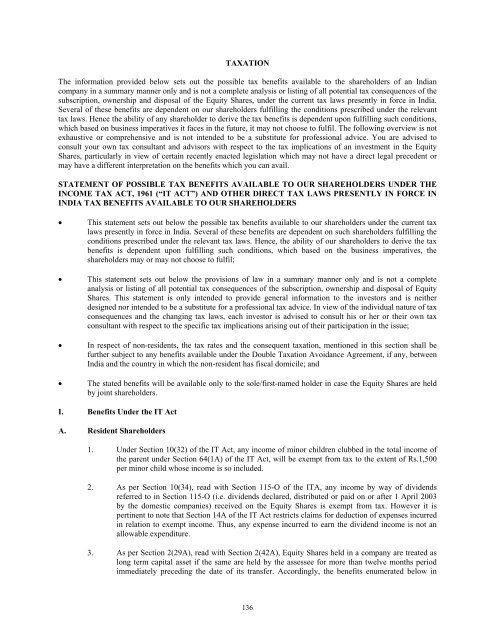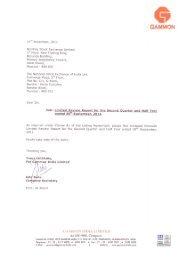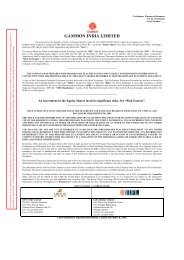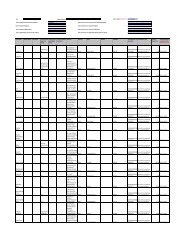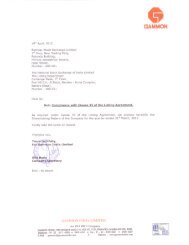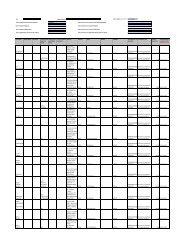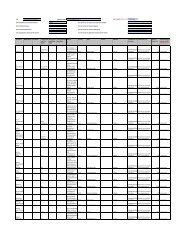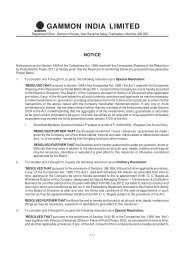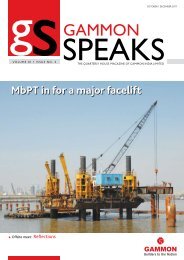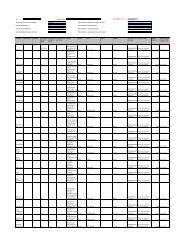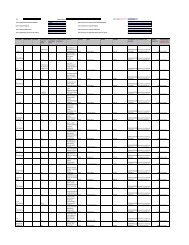GAMMON INDIA LIMITED
GAMMON INDIA LIMITED
GAMMON INDIA LIMITED
Create successful ePaper yourself
Turn your PDF publications into a flip-book with our unique Google optimized e-Paper software.
TAXATION<br />
The information provided below sets out the possible tax benefits available to the shareholders of an Indian<br />
company in a summary manner only and is not a complete analysis or listing of all potential tax consequences of the<br />
subscription, ownership and disposal of the Equity Shares, under the current tax laws presently in force in India.<br />
Several of these benefits are dependent on our shareholders fulfilling the conditions prescribed under the relevant<br />
tax laws. Hence the ability of any shareholder to derive the tax benefits is dependent upon fulfilling such conditions,<br />
which based on business imperatives it faces in the future, it may not choose to fulfil. The following overview is not<br />
exhaustive or comprehensive and is not intended to be a substitute for professional advice. You are advised to<br />
consult your own tax consultant and advisors with respect to the tax implications of an investment in the Equity<br />
Shares, particularly in view of certain recently enacted legislation which may not have a direct legal precedent or<br />
may have a different interpretation on the benefits which you can avail.<br />
STATEMENT OF POSSIBLE TAX BENEFITS AVAILABLE TO OUR SHAREHOLDERS UNDER THE<br />
INCOME TAX ACT, 1961 (“IT ACT”) AND OTHER DIRECT TAX LAWS PRESENTLY IN FORCE IN<br />
<strong>INDIA</strong> TAX BENEFITS AVAILABLE TO OUR SHAREHOLDERS<br />
This statement sets out below the possible tax benefits available to our shareholders under the current tax<br />
laws presently in force in India. Several of these benefits are dependent on such shareholders fulfilling the<br />
conditions prescribed under the relevant tax laws. Hence, the ability of our shareholders to derive the tax<br />
benefits is dependent upon fulfilling such conditions, which based on the business imperatives, the<br />
shareholders may or may not choose to fulfil;<br />
This statement sets out below the provisions of law in a summary manner only and is not a complete<br />
analysis or listing of all potential tax consequences of the subscription, ownership and disposal of Equity<br />
Shares. This statement is only intended to provide general information to the investors and is neither<br />
designed nor intended to be a substitute for a professional tax advice. In view of the individual nature of tax<br />
consequences and the changing tax laws, each investor is advised to consult his or her or their own tax<br />
consultant with respect to the specific tax implications arising out of their participation in the issue;<br />
In respect of non-residents, the tax rates and the consequent taxation, mentioned in this section shall be<br />
further subject to any benefits available under the Double Taxation Avoidance Agreement, if any, between<br />
India and the country in which the non-resident has fiscal domicile; and<br />
The stated benefits will be available only to the sole/first-named holder in case the Equity Shares are held<br />
by joint shareholders.<br />
I. Benefits Under the IT Act<br />
A. Resident Shareholders<br />
1. Under Section 10(32) of the IT Act, any income of minor children clubbed in the total income of<br />
the parent under Section 64(1A) of the IT Act, will be exempt from tax to the extent of Rs.1,500<br />
per minor child whose income is so included.<br />
2. As per Section 10(34), read with Section 115-O of the ITA, any income by way of dividends<br />
referred to in Section 115-O (i.e. dividends declared, distributed or paid on or after 1 April 2003<br />
by the domestic companies) received on the Equity Shares is exempt from tax. However it is<br />
pertinent to note that Section 14A of the IT Act restricts claims for deduction of expenses incurred<br />
in relation to exempt income. Thus, any expense incurred to earn the dividend income is not an<br />
allowable expenditure.<br />
3. As per Section 2(29A), read with Section 2(42A), Equity Shares held in a company are treated as<br />
long term capital asset if the same are held by the assessee for more than twelve months period<br />
immediately preceding the date of its transfer. Accordingly, the benefits enumerated below in<br />
136


